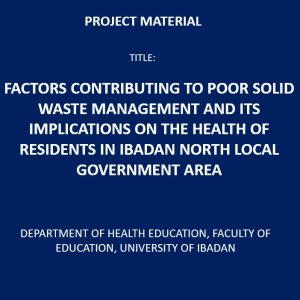No products in the cart.
Assessment of Local Government Employees’ Reward System in Oyo State
₦10,150.00
ASSESSMENT OF LOCAL GOVERNMENT EMPLOYEES’ REWARD SYSTEM IN OYO STATE
- CASE STUDY: IBADAN NORTH LOCAL GOVERNMENT
- NUMBER OF PAGES: 51
- FILE TYPE: DOC
- DEGREE: HND
- DEPARTMENT: PUBLIC ADMINISTRATION, FACULTY OF BUSINESS AND COMMUNICATION STUDIES, THE POLYTECHNIC, IBADAN
Background to the Study
Reward systems are arguably at the heart of employee performance in any organization. This assertion is premised on the understanding that reward systems have the potency of engendering through the stimulation and direction of employees along the path of goal accomplishment (Ejumudo, 2014). As a matter of fact, employees are the most critical of all organizational resources and their capacity to function of both their inward potentials and the outward environment in which they operate. This nature-nurture perspective of explaining the indicators of employee performance underscores the indispensability of reward systems as an integral part of organizational environments. In the light of this, it is instructive to assert that well rewarded employees are much likely to feel valued and cherished by their organizations.
Employee reward can either be financial or non-financial or both. What is important is that an employee is adequately compensated for his efforts and such practice actually induces him for greater performance (Gunu, 2005). However, reward that motivates employees may not be the same for everybody. In fact, Fery (1997) argues that once pay exceeds a subsistence level, intrinsic factors are stronger motivators and staff motivation requires intrinsic rewards such as satisfaction at doing a good job and sense of doing something worthwhile. According to Perry (2006), financial rewards is not the most motivating factors as it sometimes show some de-motivating effects among high level employees.
Reward systems are arguably at the heart of employee performance. This assertion is premised on the understanding that reward systems have the potency of engendering higher levels of performance in organizations through the stimulation and direction of employees along the path of goal accomplishment (Ejumudo, 2011). As a matter of fact, employees are the most critical of all organizational resources and their capacity to function and meet the expected standards is a function of both their inward potentials and the outward environment in which they operate. This nature-nurture perspective of explaining the indicators of employee performance underscores the indispensability of reward systems as integral part of organizational environments. In this light, it is instructive to assert that well rewarded employees are much likely to feel valued and cherished by their organizations.
Despite the arguably important nexus between reward systems and employee performance in both public and private sector organizations, it is worrisome to note that the much-desired employee performance that is a critical input for sustainably increasing organizational productivity is largely absent and consequently a constraining factor to the actualization of organizational goals and objectives. For instance, while Akerele (1991) blamed the low productivity level of Nigerian workers on several factors, particularly the failure of employers to provide adequate compensation for hard work, Markova and Ford (2011) emphasized that the real success of organizations originate from employees willingness to use their creativity, abilities and know-how in the direction of their organizations’ growth and development path in response to the favourably stimulating and encouraging reward practices.
The condition of employment in Nigerian local governments is not fundamentally different from other organizations in the country which implies that reward/motivation is likely to encourage performance and consequently, productivity. This study therefore seeks to assess find out the influence that reward system have on productivity in the Local Government System in Benue State.






